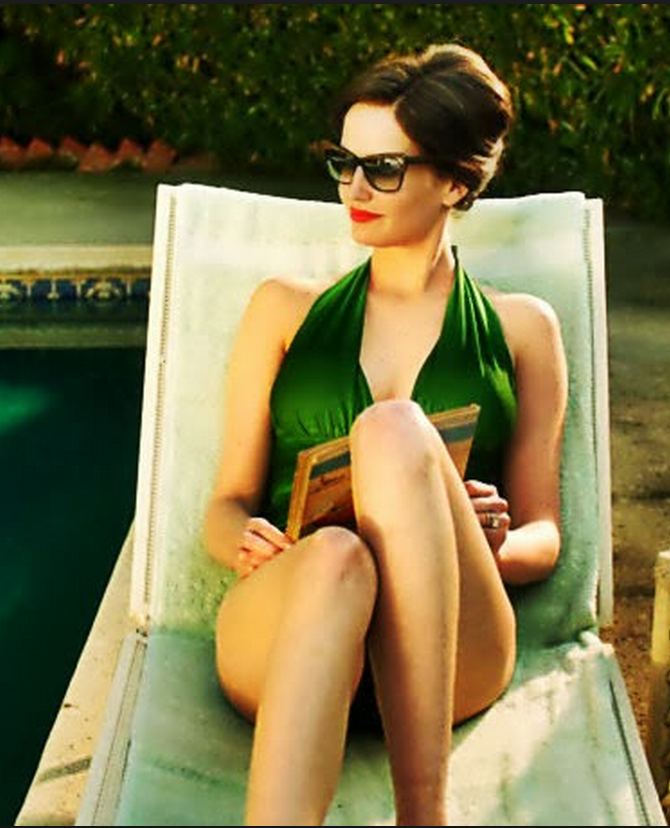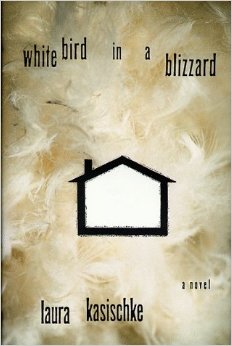 It’s hard to pinpoint the exact appeal of Shailene Woodley. Is it her throaty voice? Her eyes, piercing yet gentle? Those endless limbs, that defiant jaw? That slightly hippy-dippy honesty? Whatever it is, the twenty-two year-old can seemingly do no wrong. She’s terrific in such serious dramas as “The Spectacular Now” and “The Descendants”; she’s terrific in this year’s big-studio smashes “Divergent” and “The Fault in Our Stars.” But perhaps the true test of her potentially Julia Roberts-level stardom is whether she can carry off mediocre material. In the off-puttingly atonal “White Bird in a Blizzard,” the answer is: sort of.
It’s hard to pinpoint the exact appeal of Shailene Woodley. Is it her throaty voice? Her eyes, piercing yet gentle? Those endless limbs, that defiant jaw? That slightly hippy-dippy honesty? Whatever it is, the twenty-two year-old can seemingly do no wrong. She’s terrific in such serious dramas as “The Spectacular Now” and “The Descendants”; she’s terrific in this year’s big-studio smashes “Divergent” and “The Fault in Our Stars.” But perhaps the true test of her potentially Julia Roberts-level stardom is whether she can carry off mediocre material. In the off-puttingly atonal “White Bird in a Blizzard,” the answer is: sort of.
The film is an adaptation of Laura Kasischke’s 1999 eponymous novel about Eve, a forty-six-year-old housewife who goes missing just as her daughter Kat becomes sexually active. Put bluntly, it’s no great loss that this book is now out of print. It is littered with psychological portent that’s never quite realized, insights into mother-daughter dynamics that fall flat, and enough purple prose to make the head spin.
Consider the opening paragraph:
I am sixteen when my mother steps out of her skin one frozen January afternoon – pure self, atoms twinkling microscopic diamond chips around her, perhaps the chiming of a clock, or a few bright flute notes in the distance – and disappears.
Not even Woodley can transcend such locomotion. We know this, unfortunately, because the normally strong instincts of director/screenwriter Gregg Araki (“The Doom Generation,” “Mysterious Skin”) seem to have temporarily abandoned him, and, as Kat, Woodley is made to deliver this passage in an introductory voiceover that could put even those with the strongest of stomachs off their popcorn.
 It is possible that Woodley took this project on because of its nostalgic factor. “White Bird” is set in the late 1980s, an era she has said she “loves” in interviews. The always-fastidious Araki has a grand time capturing how the era’s punk inflections filtered down to Midwestern suburbs – big hair, baggy jeans and all. But beyond that, this choice is a head-scratcher. Not even the normally compelling Eva Green can find much to work with in Eve, a woman who seems to have been undone by her daughter’s coming-of-age. In admittedly beautifully arranged shots, she stalks her daughter – materializing in increasingly scandalous outfits of tiny 1960s-style dresses and lingerie as Kat ogles herself in the mirror and canoodles with Phil (Shiloh Fernandez), the dumbbell-boy next door. The sexually unfulfilled Eve also mocks her husband, Brock (a flat-footed Christopher Meloni), whom she announces that she “never loved.” With this predilection for scenes, Eve seems more like a stage actress or, dare I say it, a literary agent than a suburban hausfrau; in fact it’s never explained how such a theatrical showstopper became a dull man’s dull wife. Instead, one day she is simply gone.
It is possible that Woodley took this project on because of its nostalgic factor. “White Bird” is set in the late 1980s, an era she has said she “loves” in interviews. The always-fastidious Araki has a grand time capturing how the era’s punk inflections filtered down to Midwestern suburbs – big hair, baggy jeans and all. But beyond that, this choice is a head-scratcher. Not even the normally compelling Eva Green can find much to work with in Eve, a woman who seems to have been undone by her daughter’s coming-of-age. In admittedly beautifully arranged shots, she stalks her daughter – materializing in increasingly scandalous outfits of tiny 1960s-style dresses and lingerie as Kat ogles herself in the mirror and canoodles with Phil (Shiloh Fernandez), the dumbbell-boy next door. The sexually unfulfilled Eve also mocks her husband, Brock (a flat-footed Christopher Meloni), whom she announces that she “never loved.” With this predilection for scenes, Eve seems more like a stage actress or, dare I say it, a literary agent than a suburban hausfrau; in fact it’s never explained how such a theatrical showstopper became a dull man’s dull wife. Instead, one day she is simply gone.
Kat takes her mother’s absence in stride, dutifully showing up for sessions with her shrink (Angela Bassett) but only coming fully alive when atop Phil or, after that relationship inexplicably fizzles out, the age-inappropriate detective on her mother’s case (Thomas Jane). She also transforms, quite suddenly, from a dumpy misfit to a preternaturally self-possessed sylph. Freudian subtext as oversaturated supertext: dispense with the mother, make love with the father (stand-in). Excuse me while I yawn, for even our Miss Woodley can’t find her way in such a trajectory. She radiates a vague, almost unsettling bemusement throughout, and tantalizes far less than she normally does, despite the fact that this film marks Baby’s first nude scenes.
Kasischke’s novel is the sort that conflates glaring holes with artful ambiguity and concludes with a number of unanswered questions. It is told from the perspective of Kat, who mostly lingers on the mutual resentment and sexualized admiration that distinguishes her relationship with her mother.  Perhaps at a loss about how to translate such interiority to screen, Araki adds an eerie, almost supernatural quality to the story. We know a big cliff-hanger is on the horizon – we hope so, anyway, to legitimize the otherwise-plodding lack of action – but it seems that it may be a “Sixth Sense” sort of twist.
Perhaps at a loss about how to translate such interiority to screen, Araki adds an eerie, almost supernatural quality to the story. We know a big cliff-hanger is on the horizon – we hope so, anyway, to legitimize the otherwise-plodding lack of action – but it seems that it may be a “Sixth Sense” sort of twist.
Suffice it to say Araki leaves no plot point hanging. Rather, it all is brought back down to earth – thuddingly. Kat may be more developed physically than mentally but as an audience we are not afforded the luxury of such ignorance. Events are ultimately spelled out in a way that betrays a novel one would have thought was not good enough to be betrayed.
This review was originally published in Word and Film.
